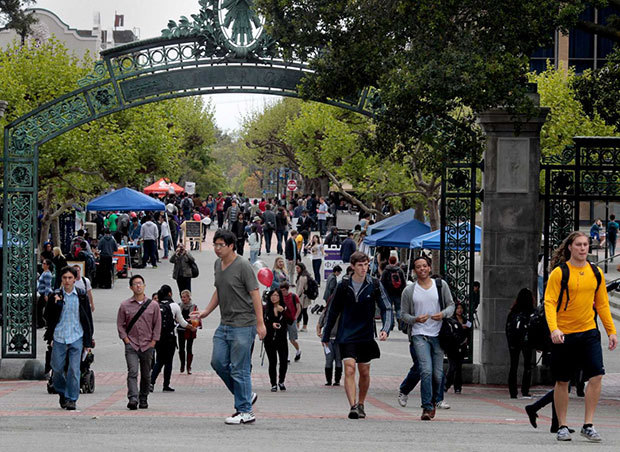UC Berkeley envisions ‘global campus’ in Richmond

Students walk through Sather Gate at UC Berkeley.
By Matier & Ross
UC Berkeley is pushing an ambitious plan for a “global campus” — inviting public universities around the world, as well as tech and other companies, to set up shop up on 134 acres it owns in Richmond.
Officials tell us they hope to break ground in a year.
The plan calls for 5.5 million square feet of development at the Richmond Field Station along the waterfront, which now consists of an industrial-toned collection of warehouses, office space and labs. It’s all sprawled over a space about two-thirds the size of San Francisco’s Mission Bay development South of Market.
While declining to provide names, UC Berkeley spokesman Dan Mogulof said officials are in “advanced stages” of talks with four or five universities in Asia and Europe about partnering to set up advanced-degree and other programs in Richmond.
The idea is to reverse the trend among U.S. universities that have tried to expand their influence by opening satellite campuses in such far-flung places as the United Arab Emirates, China and Singapore.
“We are turning (the concept) inside out” by building “a campus here on the property we have in Richmond, and bringing the world to us,” Mogulof said.
Chancellor Nicholas Dirks may have been hinting at potential partners recently when he told the publication Inside Higher Ed, “I’ve traveled recently to universities in Singapore and China and Japan, and I’m on my way tomorrow to Cambridge, England.”
Dirks and a five-member UC Berkeley delegation also just returned from the big World Economic Forum in Davos, Switzerland, where they worked to drum up more support and potential investors.
Dirks recently told the UC Berkeley Academic Senate that bringing a world university here — rather than having UC setting up shop in Asia and the Middle East — removes any fear that U.S. scholars will have their academic freedom compromised abroad. He called the prospective Richmond campus “a safe harbor in a safe harbor.”
On the other hand, it’s just a few miles from Richmond’s crime-plagued Iron Triangle, raising the question of just how easy it will be to attract investment there.
“I think the perception is far worse than reality,” said Terezia Nemeth, a former development manager for UCSF’s Mission Bay campus who is now working on the Global Campus. “I think it will sell itself — it’s a beautiful site and well positioned.”
UC has already spent $25 million on toxic remediation and has approval to develop the site. Nemeth said officials are “looking actively” to pay for it by partnering with philanthropists, other universities, and private industry that already works with UC on research.
“I’m very optimistic,” she said.
“I hope they’re right,” said Richmond City Manager Bill Lindsay, who has been trying to get development in the area jump-started for years.
That effort, by the way, hit a big snag in 2013 when the Lawrence Berkeley National Laboratory lost out to Stanford for a highly coveted, $1.5 billion federal contract to build the world’s most sophisticated super X-ray microscope at the Richmond Field Station site.
[Source]: SF Chronicle


